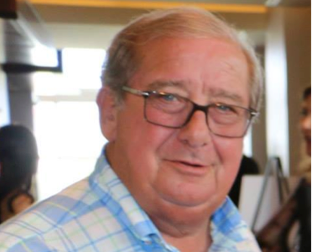FAB's Pat Roberts on Preparing for Hurricane Matthew
TALLAHASSEE, FLA.—Hurricane Matthew is expected to make landfall in Florida on Thursday, Oct. 6. Reports of devastating winds and storms, which have already hit countries like Haiti, predict this as being one of the worst storms to hit Florida in years. We talked with Florida Association of Broadcasters President and CEO Pat Roberts on what his organization what measures both broadcasters and their audiences have taken to deal with the incoming storm.

TV TECHNOLOGY: What has Florida Association of Broadcasters done in preparation for Hurricane Matthews?
PAT ROBERTS: First of all, what we try to do is communicate with our members. We did yesterday, we’re getting ready to do another blast email right now. We also work with the state and the FCC to make sure stations know what they’re rights are during a disaster as far as emergency procedures for power, getting fuel.
In Florida, after health care providers and law enforcements, broadcasters are in third place, especially radio. Because when you have a hurricane you’re going to lose power, and then you’re cable doesn’t work, you’re TV doesn’t work, so radio becomes a lifeline to the community when you have a disaster.
But I’ve been here and the broadcasters have been heavily involved before in preparing people for a storm. They’ve been involved in the response during the storm and hopefully have saved lives by telling people what to do. And most importantly, play a major role in recovery on telling people when they can go back, what they can do and where they can go.
Stations in all these markets, and of course this time it literally covers over 60 percent of our population and over half the state is potentially impacted by this. Even Miami will not take a direct hit but it will have tropical storm winds, which means they are going to have power outages even in south Florida as it comes up middle of the coast. Looks like landfall is gonna come in at Melbourne or somewhere near there, or Daytona, and then stay on the coast all the way up to Jacksonville and then into Georgia and the Carolinas.
Good or bad, a lot of the engineers have been here for many years. We have a lot of new general managers, but the engineers know what we have to do after what we went through in 2004, 2005.
Get the TV Tech Newsletter
The professional video industry's #1 source for news, trends and product and tech information. Sign up below.
TVT: What are the engineers’ main tasks during disasters like this?
PR: Well they need to make sure their stations stay on the air, because they are probably going to lose power, so they are going to be going to generators. I hope and trust they all went out and not only have had their generators checked every month, but they went yesterday and checked if they had fuel.
Back in ’04, we had one station who after getting hit by four hurricanes, their tower site… we literally had to get the Army national guard to take a truck load of fuel to them or they would have gone off the air. We have much better fuel situation in Florida now for everybody, with generators, gas stations and all of that, but they have to make sure they’re ready to go.
The other big thing that Florida did starting after Andrew was partner up television stations with radio stations. So if the radio station doesn’t have any news staff, or a small news staff, television has a mammoth one, so they provide that on their airwaves. So even if you can’t get TV, you can hear the newsroom, and most importantly the meteorologists at the TV stations to tell you what’s happening, when it’s going to happen, and what you need to do.

Pat Roberts
And then we start putting out information on shelters and then we go to recovery, on where you can… what grocery stores, gas stations, what’s open, what’s not open. One thing we started back 10, 12 years ago, we have pet friendly shelters because we were finding elderly and some young people would not leave their pets and they got hurt. So now we have shelters without pets but we shelters that take parts.
Our job is to truly inform the public during emergencies, and I got to be honest, this is when I’m proudest of broadcasters. With all due respect, cable doesn’t really care what happens locally because there are cable networks nationwide. And a newspaper is a day late and a dollar short; you can read it the day after it hits, but you’re not there telling what it is going down. This is when radio especially, and TV feeding their news and information through to radio, not only saves lives but informs the public in real-time what they need to do.
TVT: What procedures have you enacted to keep broadcasting staffs are safe?
PR: All years we put out guidelines and they all know they got to first worry about their staff and make sure their staff’s families who are in an evacuation zone go get a hotel, they need to plan that early. They make sure they have enough fuel and food at their stations to stay on the air. Most of the stations in Florida have been through this enough that they have to be prepared to continue working. They’re not like a restaurant or a hotel, or an auto dealer, or a school system, they can’t leave. Their job during disasters is to be there and speak to their community. Florida broadcasters take that very seriously.
